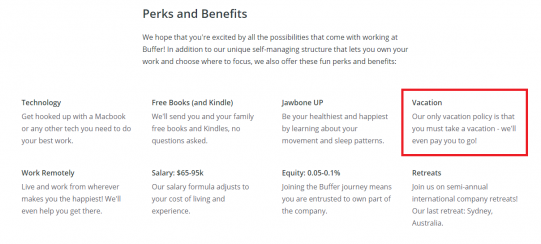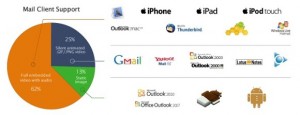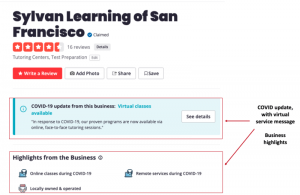
When you’re an entry-level employee, the spotlight is on you to perform. You likely have minimal experience, and you’re looking to impress your employer so you can quickly move up in the industry.
We’ve all been there before. Some of us are even in this position now (ahem).
New York Times Best Seller The Power of Habit details the phenomenon of habits, and the power they can have to make us succeed. Our behavior is shaped by our habits, both the bad and good ones. The best part is that we can form new habits, and change the bad ones.
It’s best to start forming good habits early. Take your career by the horns and write your own story. Follow these six tips to form better habits that will jumpstart your success. Thank yourself later.
1. Stay Organized
Now I’m usually a disheveled mess. But I’ve been trying really hard to keep myself organized, and I’ve seen enough payoff to suggest this to you as Habit #1.
When you’re starting your career, things can easily get overwhelming. You need to quickly establish a routine if you want to keep everything in line. Try some of these tips, and you’ll develop healthy habits that will keep you organized moving forward:
- Start Using Productivity Tools. The two tools I use most are Trello and Todoist. Trello allows you to sort ideas, notes, and tasks onto cards on a Trello board. Todoist is a simple “to-do list” platform that syncs across devices, allowing you to easily organize your tasks for the day.
- Take Notes. Most of you might be used to taking notes from school. Don’t stop this. Many things will pop up during your work day, but you don’t want them to interfere with your current project. Keep a notebook handy, write down anything and everything you want to remember for later.
- Keep Digital Copies. Tools like Dropbox and Google Drive allow you to save everything to the cloud. Sure, notebooks and Post-it® notes are great. But nothing beats Google Drive when you’re trying to save ideas on the go, or edit your notes from your computer at home. You can also easily share and collaborate with others.
- Organize Your Desk. Your physical space needs the same attention as your digital space. If you have drawers, bins, and containers – use them. Keep related Post-it® notes in clusters, organize your printouts, and keep things clean.
These tips make it easier to work, and allow you to get more done with your time. You’ll appreciate the efficiency, and your team will appreciate the productivity.
2. Always Continue Learning
Have you heard of Google’s 20% rule? At one time, Google encouraged their employees to spend 20% of their time on side projects. While this policy may be a thing of the past for Google, the idea was to foster creativity for their employees.
The concept has its merits. One study found that creative activity can increase overall job performance.
While not all employers allow you to explore creative outlets on the clock, you still often have the opportunity to learn new skills or take on new projects on the job. eZanga allows me to listen to webinars, join Twitter chats, and even learn coding through Codecademy. These allow me learn, grow, and apply skills to future company projects.
Even if you have no time to learn on the job, you can supplement this by learning off the clock. Read a book, learn a new skill, travel. Always continue learning.
3. Balance Work and Life
All of us strive for some sort of work-life balance. Asking for more of the “life” doesn’t necessarily mean you want less of the “work.” In fact, the most effective employees are those that value their leisure time, know how to vacation, and work to live.
This is actually a huge field of study. Vacation days each year go unused, even though it’s shown that taking vacations leads to greater productivity and job satisfaction once you return.
Employers are slowly starting to realize this. A quick look at Buffer’s job benefits shows that they’ll make you go on a vacation once per year, even if they have to pay for it.

A lot of people will still claim that they really just can’t go on vacation, or use any time off. It’s understandable that you have a lot of work to get done, and simply can’t afford to take PTO. But research shows that you should at the very least take frequent breaks on the job.
Breaks give us a chance to cool down. Science shows that working for too long starts to wear us down, causing us to be less productive. There are studies that prove that any break can increase performance, from a five-minute walk to a 30-second microbreak.
After all, we start to burn out after working for even 90 minutes straight (let alone eight hours a day, five days a week).
Attaining work-life balance nowadays is tough to achieve, but technology is starting to offer a simpler path to work-life integration. It’s no longer a necessity for all employees to work on the job site from 9-to-5. Many employers allow you to telecommute, work abroad, or work on the road. It’s an opportunity most Millennials actually look forward to.
Your job will be weaved in with your life. This increases satisfaction and performance along with employee autonomy.
Too many entry-levels assume they have to work nonstop in order to advance. But be wary of burning out. The best workers know how to take a break, go on vacation, or optimize their leisure time to refuel.
4. Talk to People
Some of us are simply introverted, I get it. But if you want to ensure success in your field, no matter the field, you have to be proactive in talking to people. This is important for two reasons: you have more resources now, and you’ll have more connections later.
Assume you’re taking on a project, and you know your results will be paltry unless you get the help of a key influencer in the industry. This is where it helps to network now. Make connections to as many people as you can, and maintain them. Even if you haven’t talked to that key influencer, you may already know someone who has.
As you accumulate connections, you make it easier to advance in your field as well. The people you know and have spoken to once or twice are known as your weak ties (as opposed to your closest friends and coworkers, who are your strong ties). Research has shown that these weak ties are best at landing you that next job.
Yes, your weak ties are better at getting you that next job than your strong ties. This is why networking is so crucial for your future.
5. Be a Detective
Managers love when you bring new ideas and solutions into the fold. When you’re given a project, they obviously expect you to perform well on it. This makes it hard to really wow your manager.
Of course, continue to excel in those projects. But if you want to stand out as an entry-level employee, you have to sniff out new problems and think of innovative solutions.
Take a look at some of your marketing analytics. Notice any trends?
Maybe there’s a dip in sales that correlates with an ad campaign you’re running. Once you figure out these ads were targeting the wrong demographic, you’ll be lauded as a hero.
In order to better catch these problems, you need to do some detective work on the regular. Don’t have accurate analytics? Run some new ones. Look for any quirks in your operations, and think of creative ways to solve them.
Think of your workday as an episode of Scooby Doo or House. Be sure to always do investigative work, even when everything seems just fine. And when you find a problem, make like Dr. House and brainstorm a list of innovative solutions to try.
Once you surprise and delight your employer, you’ll start leaping up the corporate ladder.
6. Assert Yourself
Sure, you’re not as confident as your superiors. You’re new to this job, you may be pretty unsure of yourself. I know I am at times.
But even if you’re unsure, you need to at least act confident. You’ll never be seen as knowledgeable and competent if you’re always questioning your own actions. This is why you need to make it a habit to assert yourself.
Research from Columbia University shows that the most effective leaders have a happy medium of assertiveness. They’re never too passive, and they’re rarely aggressive. If you’re looking to advance in your career, being assertive is the way to go.
Start believing in your ideas now, and your team will have more trust in you and your wisdom. Even when you happen to be wrong, own up to it, learn from your mistakes, and continue on. Being assertive and confident can make you more productive, get you that salary increase or promotion, make you a better leader, and increase your odds for that new job down the road.
Being too passive or aggressive makes all of that much more difficult to accomplish.
Build a Better You
Once you establish habits, they’ll stick with you. These are just a few habits that can be very helpful later in your career. They’ll even make you more productive right now.
And while this is geared mostly to you entry-levels out there, this is career advice that anyone could take away. And it’s never too late. Taking on these habits can set you apart from your co-workers, and ensure more success in your field moving forward.
Business & Finance Articles on Business 2 Community(117)






